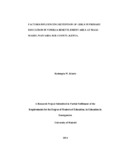| dc.contributor.author | Kiarie, Redempta W | |
| dc.date.accessioned | 2014-12-09T13:35:42Z | |
| dc.date.available | 2014-12-09T13:35:42Z | |
| dc.date.issued | 2014 | |
| dc.identifier.citation | Degree of Masters of Education, in Education in Emergencies,2014 | en_US |
| dc.identifier.uri | http://hdl.handle.net/11295/76957 | |
| dc.description.abstract | In a case of emergency and conflicts like the post-election in 2007,
communities, especially in the resettlement areas struggle to keep their
children in school because of instability, shortage of resources and the
threat of violence. This study sought to examine the factors affecting
retention of girls in primary education in Vumilia Resettlement Area,
Naivasha District in Kenya. It was guided by the following objectives ;
to establish how households, girls related factors, security and children
separation from their families affect the retention of girls’ in primary
education. The researcher used descriptive survey design in the study.
The target population was 337 (251 girls and 76 teachers) in the study
area. A sample of 203 girls and 43 teachers were selected through
simple random sampling. A pilot study was carried out on different set
of respondents to help plan for the research. Data collected was
analysed and presented through tables and narratives. The research
findings indicated that the retention of girls in primary education is
hampered by girls being heads of households. Schools are organizing
workshops to educate parents on the need to educate their girls. The
study concludes that the community should be sensitized on the need
for the girl child to be in school. There were incidences of girls
dropping out of school to provide for their families. The study
concluded that efforts should be made to tackle girl related problems to
retain them in school. The community should participate fully in
offering security. The study concluded that there is insecurity at the
resettlement area. The study recommended provision of adequate
security. The cases of children being separated from families were
minimal an indication that many girls lived with their parents or legal
guardians. Girls who live alone should be re-united with legal guardians
or be accommodated in orphanages. These calls for strong partnerships
between parents, teachers and pupils in conjunction with other arms of
the government in order to ensure girls are and remain in school | en_US |
| dc.language.iso | en | en_US |
| dc.publisher | University of Narobi | en_US |
| dc.title | Factors influencing retention of girls in primary education in vumilia resettlement area at Maaimahiu, Naivasha sub-county, Kenya. | en_US |
| dc.type | Thesis | en_US |
| dc.type.material | en_US | en_US |

